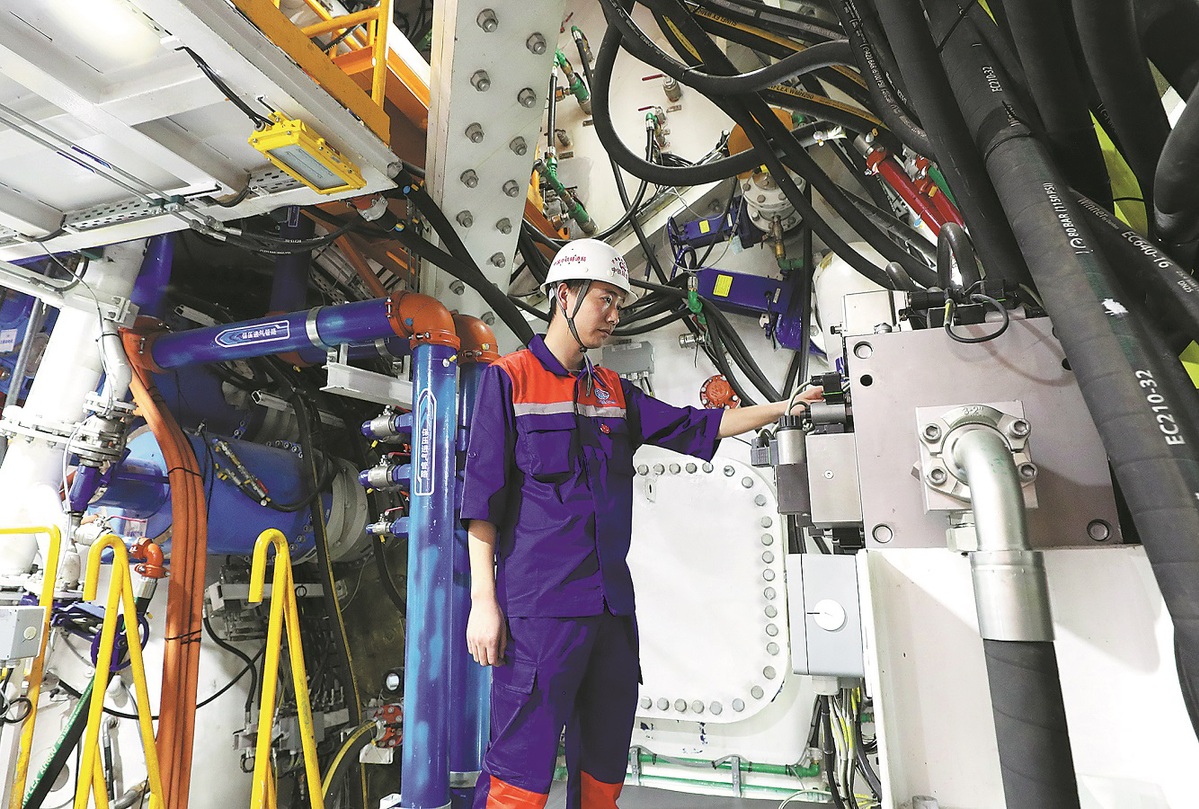Chinese-made tunneling machine passes milestone

A technician examines equipment inside the world's largest shield machine for railway construction in April before it began operation. (FANG ZHE/XINHUA)
The world's largest shield machine for railway construction, a tunneling device with a diameter of 15.4 meters, excavated its 1,000th ring segment on Sunday to reach 2 kilometers, a milestone in the construction of a tunnel beneath the Yangtze River for a high-speed railway.
The achievement also means that the shield machine, called Linghang, which was independently developed by China, is pressing ahead to a higher level of construction difficulty, according to China Railway Tunnel Group Co, constructor of what will be a 14.25-km underwater railway tunnel linking Shanghai's Chongming Island with Taicang, a city in Jiangsu province.
"With a gradual, slight downward slope, the pressure from the surrounding water on the construction project is escalating. Many parts of the tunnel to accommodate railway tracks in both directions are to be built at 89 meters underneath the river, where the water pressure is 0.9 megapascal — as enormous as holding six people on a fingernail," said Fu Bowei, the project's deputy chief engineer.
"Such gigantic water pressure places high demands on the performance of our equipment and technologies," Fu said, adding that the 128-meter-long shield machine began work in April.
High-speed trains are expected to run at a maximum speed of 350 km/h inside the tunnel — the world's highest speed in underwater tunnels — and outside the tunnel.
According to Shanghai's Jiefang Daily, the tunnel will be ready for the operation of the Shanghai-Nanjing-Hefei high-speed railway by the end of 2029.
So far, tunnel construction has crossed the embankment on the north side of the Yangtze River and proceeded more than 1,100 meters into the riverbed, and the excavation environment has changed from soft soil to sandy formation.
"Moreover, hard cement is contained in the environment, which makes the shield cutter easy to wear during tunneling. The shield machine is equipped with a system to detect tool wear. Whenever wear is detected, we make corresponding adjustments," said Fu.
"Also, the construction is currently under a protection area for aquatic products, and we must optimize tunneling parameters, including those regarding slurry pressure, thrust and advancing speed, to make its operation adaptable to the environment," he said.
The entire tunneling project needs to cross nearly 20 risk sources, including the protection areas for aquatic products as well as docks and parks, said Fu.
Liu Jianping, deputy manager of the project, said eight smart construction systems, integrating technologies such as cloud computing and virtual and real integration, as well as artificial intelligence inspection, are being deployed.
These smart systems will be used in tunneling, assembly, prefabrication, transportation, ventilation, detection and management, and control.
The Shanghai-Nanjing-Hefei high-speed railway is the eastern section of the Shanghai-Chongqing-Chengdu high-speed route, and is an important part of the high-speed rail corridor along the Yangtze River in the nation's "Eight Vertical and Eight Horizontal" rail network.
The project will create a fast new channel between a megacity cluster with Shanghai as the core as well as two city clusters centered on Nanjing and Hefei.
It is expected to further bring cities in the Yangtze River delta closer to one another, serving the coordinated development of the Yangtze River Economic Belt and promoting the integrated development of the delta region.
Photos
Related Stories
- China leads world in charging infrastructure installation number: NDRC
- Major projects move forward, acting as economic accelerators
- Minqing county in SE China's Fujian Province cultivates thriving green construction
- New generation of unmanned remote tower crane launched in Qingdao
- China strives to promote coordinated development of new information infrastructure
Copyright © 2024 People's Daily Online. All Rights Reserved.









